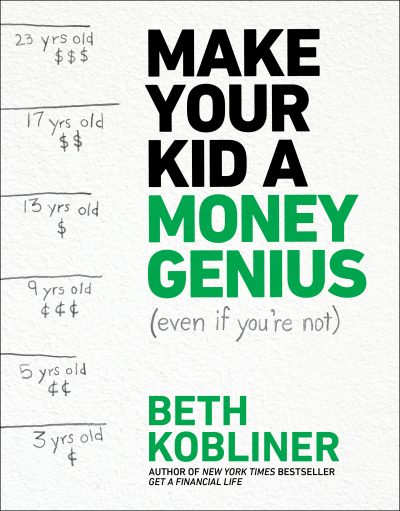Advertisement
How To Teach Kids Money Smarts From An Early Age

How can parents teach their children about the value of money? And how early should those lessons start?
Financial writer Beth Kobliner (@BethKobliner) joins Here & Now's Jeremy Hobson to talk about her new book, "Make Your Kid a Money Genius (Even if You're Not)."
Book Excerpt: 'Make Your Kid A Money Genius (Even If You're Not)'

By Beth Kobliner
The fact that you’re reading this means you know you should talk money with your kid. Whether the subject terrifies you or intrigues you, or you’re simply looking for ways to broach the topic, the good news is that you’re plunging in. Go, you!
A few quick words about this chapter. Though its title might make it sound like I’m expecting you to be a financial drill sergeant (“Now drop and give me 20 compound-interest calculations!”), I’m not. This chapter is the gentle one, meant to ease you into some overall concepts—and context—that’ll help you engage with your child about money. Some points will apply, others might not, depending on your kid’s age, interest level, and even gender. So don’t think that you need to commit everything to memory or take furious notes. The idea here is to put down your highlighter and just read.
One final thought before we begin: Money conversations don’t happen in a vacuum. Instead, they pop up at various times throughout the messy business of living. Though it’s become a cliché, most learning happens during these everyday “teachable moments.” The tips below and throughout this book are meant to help you take advantage of these opportunities.
Advertisement
So here we go.
1. Start even earlier than you think you should. By the ripe old age of 3, researchers at the University of Wisconsin–Madison report, many children are able to grasp economic ideas such as value and exchange, albeit in a very rudimentary way. They can also delay gratification and make choices. Though basic, all these concepts are important in understanding the role of money in our daily lives. Although there’s no economic equivalent of Baby Mozart videos, no stuffed dolls that look like Warren Buffett to tell your kid to “buy low and sell high” when you squeeze them, that doesn’t mean you shouldn’t pay attention to this stuff when your child is small.
Your toddler is eager, and able, to understand a lot. When you notice your little one “swiping” a pretend credit card, asking to push the buttons at the ATM, or looking through your wallet, instead of chuckling indulgently in a “kids say the darndest things” way, start teaching him some of the basic lessons in this book about where money comes from and how to pay for things. Even if your preschooler doesn’t absorb it all, he will still notice that you’re talking to him about something that matters—something grown-ups care about. And odds are, he’s already soaking up more than you think.
2. Keep it age appropriate. Sticking to the truth is good when it comes to money, but so is adapting your message to your kid’s level. If you lose your job, it’s fine to say to your elementary schooler, “We’re going to cook at home more, since that costs less than eating out.” Skip the part about being in such dire straits that you’re dipping into your 401(k) to make ends meet. Given the same scenario but with a kid in high school, talking about how the loss of an income will affect college financing would be not only acceptable but also wise. You can discuss the reality that your family might not be able to put as much toward college expenses, but at the same time explain that she might qualify for more financial aid. In general, when it comes to having any hard money talk with your kid, it’s good to tell it like it is, but also offer reassurance that she—and you—will be okay.
3. Use anecdotes. More often than not, when we launch into lecture mode, our kids tune out. Or, worse, our pontificate-y good intentions backfire and push our children to do the opposite of what we’re trying to get them to do. Instead, use stories to illustrate a point. When my friend couldn’t get a decent rate on a car loan because she’d run up too much debt on her credit card on a monthlong, over-the-top European trip the year before, I told my kids the details (without mentioning her name). Anecdotes such as these, which highlight how financial blunders lead to consequences, tend to stick in kids’ minds. Same is true of positive lessons, like an example of the neighbor who saved religiously for ten years, putting aside 1% of every paycheck, so that he could finally buy his dream fishing boat. You get the idea.
4. Use numbers, even if you’re mathphobic. People understand money concepts better when a point is made with specific numbers. Saying to your kid, “It’s so important to put money into your 401(k) even when you’re young,” is much less effective than offering an example. “If you put $315 every month into a 401(k) starting at age twenty-two, by the time you reach age sixty-five, you could have more than a million dollars.” (The very words million dollars invariably make kids take notice.) If you have no idea where to get the numbers to show your kid, use some of the examples from this book or, if you’re feeling ambitious, check out the simple online financial calculators on a website such as Moneychimp.com. (I used a compound-interest calculator to crunch the numbers for the example above, and I promise it’s easy. Really.)
5. Don’t lie about your money past — but don’t overshare, either. Most of us have had a flirtation with bad money management at some point, whether we ran up too much on a credit card or bounced a check or two (or 10). But resist the urge to come clean about your money mistakes to purge your own feelings of guilt or irresponsibility: Your kid isn’t your financial advisor—or your priest. Take a page from the latest research on talking to kids about drugs, which shows that parents who have themselves indulged in the past should not go into details with their kids. If you’re answering a direct question, definitely pick and choose which financial sins you disclose; tales of emptying your bank account for a road trip with an old boyfriend or blowing through your 401(k) savings to fund a wacky business scheme may glamorize what were actually regrettable decisions that took you many years to overcome.
Excerpted from the book MAKE YOUR KID A MONEY GENIUS (EVEN IF YOU'RE NOT) by Beth Kobliner. Copyright © 2017 by Beth Kobliner. Reprinted with permission of Simon & Schuster.
This segment aired on February 7, 2017.